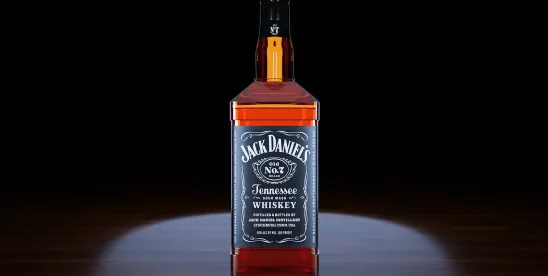Addressing this case for the third time, the US District Court for the District of Arizona found on remand that Jack Daniel’s was entitled to a permanent injunction after finding that VIP Products’ “Bad Spaniels” dog toy diluted Jack Daniel’s trademark and trade dress, despite VIP not having infringed those marks. VIP Products LLC v. Jack Daniel’s Properties Inc., Case No. CV-14-02057-PHX-SMM (D. Ariz. Jan. 21, 2025).
This case began more than 10 years ago when VIP filed a declaratory judgment action that its “Bad Spaniels” Silly Squeaker dog toy did not infringe or dilute Jack Daniel’s trademark rights. Jack Daniel’s counterclaimed, alleging trademark infringement and dilution. The district court initially entered a permanent injunction against VIP, finding that VIP’s “Bad Spaniels” toy violated and tarnished Jack Daniel’s trademarks and trade dress. VIP appealed, and the US Court of Appeals for the Ninth Circuit found that VIP’s use of “Bad Spaniels” was protected expressive speech under the First Amendment. On remand, the district court granted summary judgment to VIP on infringement and dilution. Jack Daniel’s appealed, but the Ninth Circuit affirmed the grant of summary judgment.
The Supreme Court granted certiorari and held that the heightened protection afforded by the First Amendment does not apply where the contested mark is used as a trademark. The Supreme Court therefore vacated the Ninth Circuit’s decision and remanded for further consideration. The Ninth Circuit remanded the case to the district court to determine whether VIP’s use of “Bad Spaniels” tarnished and/or infringed Jack Daniel’s trademarks and trade dress, consistent with the Supreme Court’s decision.
On remand, VIP attempted to challenge the constitutionality of the Lanham Act’s cause of action for dilution by tarnishment, arguing that “the statute amounts to unconstitutional viewpoint discrimination by enjoining the use of a mark that ‘harms the reputation’ of a famous mark.” Ultimately, the district court did not consider the merits of the constitutional challenge. The district court stated that although it was not precluded from considering VIP’s constitutional challenge, the issue was not properly before the court because VIP had not amended its pleadings to assert the challenge.
The district court assessed dilution by tarnishment using a three-factor analysis of fame, similarity, and reputational harm. With respect to fame, the parties did not dispute that the JACK DANIEL’S mark was famous. Nonetheless, VIP contended that Jack Daniel’s had not shown tarnishment of a famous mark by a “correlative junior mark.” Specifically, VIP argued that the famous JACK DANIEL’S mark correlated with VIP’s “Bad Spaniels,” and VIP’s use of “Old. No. 2” correlated with Jack Daniel’s mark “Old No. 7.” According to VIP, there could be no tarnishment because only the latter was offensive and Jack Daniel’s had not demonstrated that “Old. No. 7” was a famous mark. The district court disagreed with VIP’s correlative mark argument, stating, “it is VIP’s use of Jack Daniel’s marks – on a poop-themed dog chew toy – that Jack Daniel’s claims tarnish its trademarks, not ‘Bad Spaniels’ itself when taken in isolation.”
The district court had already found a high degree of similarity between the marks, which VIP did not contest because the “Bad Spaniels” toy had been “intentionally designed” to mimic Jack Daniel’s Tennessee Whiskey.
Addressing the third factor (reputational harm), the district court stated that “the relevant inquiry is how the use of the junior mark affects the consumer’s positive impressions of the famous mark.” Here, because “Jack Daniel’s produces a product intended for human consumption, association of Jack Daniel’s marks with something like dog feces is particularly detrimental,” even if “it is obviously true that ‘Bad Spaniels’ does not actually contain dog feces and consumers would not believe that it does.”
Although VIP’s “parodic intentions in creating ‘Bad Spaniels’ d[id] not exempt VIP from the [Trademark Dilution Revision Act’s] cause of action for dilution by tarnishment,” the district court noted that the parody was relevant to the likelihood of confusion analysis. When assessing a parody’s impact on the infringement analysis, the court first reviewed whether VIP’s “Bad Spaniels” product evoked Jack Daniel’s, and “whether it creates contrasts through humor adequate to dispel confusion as to the source of the parody.” Here, the court found that “Bad Spaniels” met both factors because it “both evokes and humorously contrasts with Jack Daniel’s marks such that it succeeds as a parody.”
Having established that “Bad Spaniels” qualified as a successful parody, the district court turned to the typical likelihood of confusion factors. The court noted that the finding of parody tipped some factors that would ordinarily favor the plaintiff in VIP’s favor: “Adjusting the Sleekcraft [likelihood of confusion] factors to account for parody neutralizes or flips three important factors – similarity of the marks, VIP’s intent, and strength of Jack Daniel’s mark.”
Here, the similarity of the marks favored VIP, as similarities were necessary for the parody to successfully evoke the Jack Daniel’s marks. Likewise, the strength of Jack Daniel’s marks weighed in VIP’s favor, as the “widespread recognition of the parodied trademark” allowed the parody to avoid consumer confusion. Finally, VIP’s intent in selecting the mark was a neutral factor, as VIP did not intend to create confusion or deceive consumers, but to create a parody product.
Although VIP prevailed on the issue of trademark infringement, the district court nonetheless found that a permanent injunction was appropriate here because “‘Bad Spaniels’ finds itself in the category of a non-confusion parody product that is nonetheless impermissible under the Lanham Act’s cause of action for tarnishment.”
Practice Note: It will be interesting to see whether and how this case continues. The ruling leaves open the possibility for a constitutional challenge to the Lanham Act’s cause of action for dilution by tarnishment. For now, it suggests that parodies that may be sheltered from infringement are still susceptible to dilution by tarnishment.




 />i
/>i

